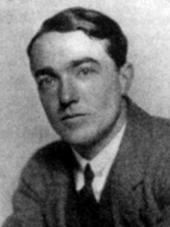Ernest John Moeran
31 December 1894 – 1 December 1950
 Ernest John "Jack" Moeran, composer and madrigalist,
survived the First World War, but having lived through the Second, it is often said that
the first claimed him in 1950. While standing on the pier at Kenmare, County Kerry in a storm in December 1950,
he was observed to collapse into the water, and was found to have suffered a brain haemorrhage.
This is sometimes attributed to a head wound he suffered over thirty years earlier.
Ernest John "Jack" Moeran, composer and madrigalist,
survived the First World War, but having lived through the Second, it is often said that
the first claimed him in 1950. While standing on the pier at Kenmare, County Kerry in a storm in December 1950,
he was observed to collapse into the water, and was found to have suffered a brain haemorrhage.
This is sometimes attributed to a head wound he suffered over thirty years earlier.
Moeran was one of the finest post-WW1 British composers, the depth and lyricism of his output
perhaps placing him at odds with later trends in music, leaving his music sadly underappreciated
and underheard until relatively recently when a number of new recordings have brought
his works to greater attention.
Moeran's music has a timeless quality. While obviously of the 20th century, he took the sound of the English folk music
revival to its apex with works such as his Symphony in G Minor of 1938 and miniatures
such as Lonely Waters, while also displaying a great influence from the composers of the English Renaissance
through his choral works (his "madrigals") and orchestral pieces such as Whythorne's Shadow and the Serenade in G.
Leading a life which was in many ways troubled and marked by self-doubt,
he found solace in the county of his childhood and his adopted spiritial home in the far South of Ireland.
Characteristically, while Moeran's experience of WWI was largely unspoken during his life, subsequent biographers
view the war as indelibly colouring his work; his biographer Geoffrey Self views the Symphony as his "war requiem", and
one cannot fail to hear a certain desolation in that unsettling yet deeply beautiful work, the
passages of great lyricism frequently interrupted by drums and dissonant brass.